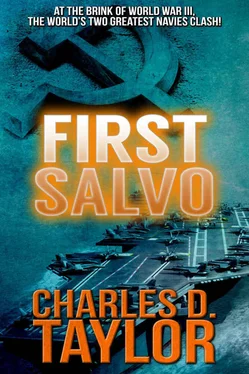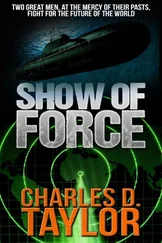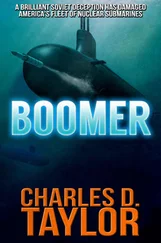Ryng rolled into a sitting position from the corpse. The boat was riddled with innumerable holes. Air hissed out, water sputtered in as it hopelessly tried to seal itself. The jagged tears were so deep that there was no chance the boat could float. Water was already lapping over one corner, its weight dragging the craft down.
The helo now hovered a few hundred yards off, still smoking. The engine was powerful enough to keep it airborne, but Ryng could sense the ragged sound of a machine struggling with itself.
There was only one option left. Ryng threw the last ammo bag around his neck and rolled off the shoreward side into the piercing-cold water less than fifty yards from land. He doubled over to pull off his shoes, then thought better of it. Once on land, he had a long way to go. He knew that the terrain was rough, all sharp stone and gravel, midsummer tundra that had defrosted down a foot or so. And there were innumerable rocky hills and cliffs along the shoreline.
The tempo of the helo’s engine increased as it dove toward him, machine guns once again blazing. The line of bullets raced toward him. He dove, struggling against the double fear of icy water as a contrast to bullets. When his lungs burned more than he could stand, he surfaced, his face in the direction where he expected the helicopter to be. It was there, hovering like a bird of prey. He sucked down another breath and arched his body to dive again. But he stopped at the last minute.
More smoke was pouring out of the craft now, dense black clouds. It was in as much trouble as he was. Maybe it would have to turn back. The odds of any man surviving alone in this water much longer were poor.
Ryng struggled toward shore, his eyes never leaving the helo. Then he saw what he had never expected. The helo was making one last pass, but it wasn’t shooting. He watched in numb curiosity, ready to dive until he saw an object fall from the side of the fuselage. As it seemed to grow in size, he realized from a distance what it was. A depth charge! The helo was equipped for antisubmarine duty. He thrashed frantically for shore.
The charge tumbled end over end, hitting the water with a huge splash, followed by a graceful waterspout.
Ryng’s mind went blind with fear. Then he grabbed his knees, rolling into a ball. The ensuing explosion thundered through his head, driving the air out of his lungs, pressing inward, forcing water down his throat, into his eyes, creating pressure like a giant sledgehammer. Time seemed to stop from the pain. He had no idea if he was conscious — no idea if he was alive or dead.
Then he found himself struggling for shore. Was there enough strength left in him to make the beach? Would he crawl out onto the sand to die in agony, spilling blood across the sand from his ruptured guts?
Strangely enough, he had some energy left, though he could hear nothing but a ringing in his head. He splashed awkwardly through the water, but there was little feeling in his hands and feet. He rolled over onto his back, expecting to see his nemesis swooping down, machine guns blazing.
But there was nothing. In the distance toward Longyearbyen, he made out a smoky cloud descending toward the land. It must be , he thought. The damned helo couldn’t stay up any longer . Then he realized the ammo bag, with his only weapon, was gone!
He turned back on his belly and pulled for the shore, not more than twenty yards away now, though it seemed like miles. Each yard closer to the beach became interminable. But his will to live won out. Only sheer determination got him the last few feet to the water’s edge.
Dragging himself out of the water onto the beach was an even greater effort. There was some sand, but mostly rocks. Yet they were like a down pillow to him, so soft and welcoming after the terror of nearly drowning.
There was some scrub brush farther up the beach beyond the high-tide mark. He half crawled, half dragged himself into it, then fell forward on his face. It seemed natural to him that he should pass out. It would be his body’s way of telling him that he had abused it past redemption. But he remained conscious. His first physical sensation as he lay there collecting his thoughts, mentally identifying the various parts of his body that were still intact, was from his stomach. It was churning violently.
Could this be the way it would be? Safety, then death? Was it now that the insides that he couldn’t feel would suddenly turn on him? His body jerked in a spasm as he felt the sudden contractions of vomiting overwhelming him. But it didn’t matter. He had never in his life been so overjoyed at being ill. Great quantities of seawater — not blood — came up.
As his stomach completed nature’s job, he slumped down again in relief. The pressure from the depth charge must have forced all that water down his throat. He remembered the unbelievable weight on his head, his eyes. And he realized that the water must have been too shallow for the depth charge to do the job they’d intended. At that depth, the bottom must have deflected the blast upward. He vaguely remembered the tremendous waterspout. The explosion probably occurred right on the bottom so that it went straight back up rather than spreading out as it was designed to do. There had been only one blast. If they dropped any others, the water must have been too shallow to set them off!
He realized that if the water had been deeper he wouldn’t have made it. Then the exhaustion rolled over him in waves with colors flashing on his eyelids. There was no way to fight it.
Bernie Ryng was out before his eyes closed, face down in the dirt and rock — but alive!
ABOARD U.S.S. YORKTOWN , SOUTHEAST OF MALTA
Tom Carleton leaned back in the chair, touching the bulkhead under the console with his toes. Stretching his arms back behind his head, he yawned, squinting up at the ducts in the overhead of Yorktown ’s combat information center. The vague glow of red lights in the darkened room cast indistinct shadows into the gloom above him.
This isn’t where I should be , he repeated to himself once more. How many times have I said that in the last half hour? The bridge, his bridge, was two decks above his head. That’s where the captain of a warship should be.
Carleton was seated at the console of Yorktown ’s fire-control display system. In today’s Navy, at least on an AEGIS cruiser, that’s where the commanding officer fought his ship. He’d been through it all at school in the past year. There he’d been taught that today the secret to victory was the three C’s — command, control, and communications — and it all hinged on a supersophisticated electronics system within his ship’s hull that managed the defense of the whole damned battle group. But that didn’t mean that he had to like it!
It seemed to him that he was encased in this console, part of the electronic organism. In front of him, numbers and letters skipped efficiently across the display screen in digital perfection. Answers to any question he might ask the computer instantly appeared on that screen, and before him was a smaller screen which displayed what various elements of the fire-control system were doing at any given time, whether responding automatically to the computer or accepting orders from him.
But there was no longer that heady aroma of salt water, no whistling of sea breezes across the bridge, none of the familiar sounds. He was isolated within the machine, an intimate and important part, but nevertheless only a part.
“I have missile lock on, range one eight zero miles, speed mach three.” The voice in his earphones droned on. They were going through a drill, but perfection was demanded along with repetition. Even as Carleton reached to question the time of arrival of the missile, another figure appeared on the screen, announcing the answer as six minutes. “Six minutes to impact of missile,” came over the phones. It was just the same as when he’d served aboard his first ship, someone repeating what was already obvious. You could change the hardware, but changing the system was like pulling teeth.
Читать дальше












